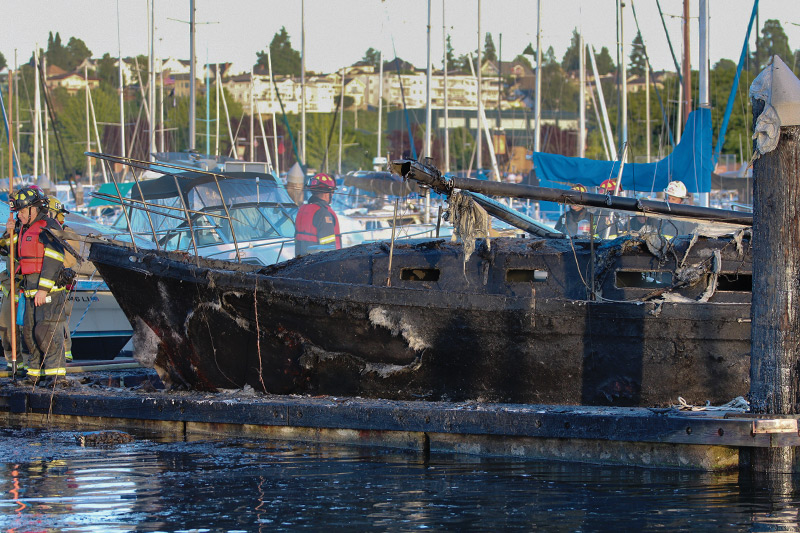On Saturday, July 8, when many of us were out on the water enjoying a beautiful summer afternoon, a boat caught fire after experiencing mechanical problems while pulling to its slip at the Port of Everett. Five boats burned and three sank before the blaze could be contained by the Port and the Everett Fire Department. Thankfully no one was seriously injured. Boat and marina fires are rare, but incidents like this one offer an excellent opportunity to do a safety check and to create an emergency preparedness plan onboard your own boat.
Electrical systems are often the initial cause of fires onboard. A shorted wire or an improperly installed AC electrical system can cause enough spark to trigger a fire, especially if there is fuel nearby. We tend to think of DC power as safer than its AC cousin, but 12 volt wires carry enough current to create sparks. Regularly inspect all DC and AC electrical systems. Replace worn wires and make sure all terminals are properly fastened. If you are not handy with such things, hiring a marine electrician is cheap insurance against a fire or explosion onboard.

boaters to freshen up on fire safety. (Photo: Leland Dart/MyEverett.com)
Fuel systems should be inspected at least once a year, and more often for boats that see heavy use. Check tanks for leaks and fuel lines for cracking, abrasion, and wear. A bilge full of gasoline fumes warrants some serious investigation, as a spark from a starter or a shorted wire can ignite concentrated gas fumes. If your boat uses gasoline, make sure you can vent all enclosed spaces to the open air. Don’t store portable fuel tanks below decks or in lockers without proper ventilation.
Propane is by far the most popular cooking and heating fuel on recreational vessels, but nothing is more explosive and dangerous onboard. Propane gas is heavier than air, and any leak will settle in the lowest reaches of the boat, just waiting for a spark. Propane tanks and canisters, even the popular disposable bottles, should be stored above decks or in a locker designed specifically to vent overboard. All fittings should be checked regularly, and appliances should be repaired and serviced at regular intervals. Proper propane systems have remote solenoid switches that shut off the gas at the tank when it is not being used. Close all tank valves when the gas appliances are not being used or when you are leaving the boat. A propane detector or “sniffer” is relatively cheap insurance against a large leak. Many models are coupled with an automatic shut-off feature that closes the solenoid upon detection of propane fumes.
While you are at it, look around your galley and barbeque areas. Things like curtains, paper, and other combustibles should be far enough away from any cooking surface to avoid catching fire.
The US Coast Guard requires fire extinguishers onboard basically all recreational vessels that have inboard engines, enclosed cabins, or permanently installed fuel tanks. Even boats with built-in fire suppression systems in the engine room likely require at least one handheld extinguisher on board. In addition, to making sure you meet the minimum legal standards, take the time to imagine your boat in a fire emergency. An extinguisher under a counter or stored in a locker does little good if you can’t get to it. Locate them in plain view, near obvious potential sources of fire like the galley or engine compartment.
Consider keeping a fire extinguisher in each cabin onboard in case someone has to escape their sleeping quarters in a fire. Place one within reach of the helm if possible.

Finally, consider having a vessel safety check performed. The Coast Guard Auxiliary and United States Power Squadrons perform free vessel safety checks at marinas across the country.
This free service will let you know if your boat meets the minimum required standards for safety at sea, including fire prevention measures. It is quick, surprisingly fun, and informative. It may also save you time and money later on if the Coast Guard inspects your boat. Check with your local marina office or go to vdept.wow.uscgaux.info for more information and to schedule a check. Your insurance company may offer a discount for having safety checks done on your boat.


